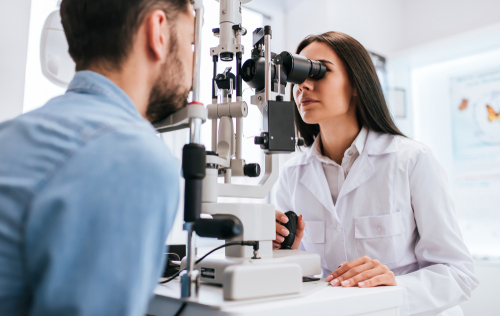
Cataract surgery can be an intimidating journey, but it shouldn’t frighten you. The process of removing cataracts is very well understood and is always being perfected.
The procedure has a low risk of failure, with most people who undergo it ending up with vision that’s as good or better than they’ve had before. The surgery itself takes minutes to complete.
It’s one of the most commonly performed medical procedures as well. Thanks to numbing eye drops, cataract surgery is also painless. The hard work comes after the surgery though as you recover.
Recovery from any surgery is going to be difficult. Fortunately for people who have cataracts, recovering from it is quite straight forward.
But no matter how careful you are, complications can still happen. Typically they occur due to something happening during the weeks and months that follow the procedure. Here are some ways to make your cataract surgery recovery as short and effective as possible!
Rest is a very important part of healing. Having cataract surgery will probably make you very tired, so napping right when you get home is a good idea.
Make sure to wear the eye shield that you’re given whenever you sleep during the beginning of your recovery. This will prevent you from damaging your eye while sleeping!
You won’t be able to drive yourself home from the clinic on the day of your procedure. Plan to have a ride to and from the office ahead of time to minimize stress on the day of.
You can still shower after the surgery, but you should avoid being submerged in water. This means no baths or swimming, and be sure to do your best to avoid getting water in your eyes when you do shower.
Even clean water is the perfect home for bacteria to breed in. You are more likely to get an infection during the early stages of recovery after you have cataract surgery.
During the surgery, an incision is made into your cornea. This incision is what needs to heal afterward. At the very beginning of the healing process, it is incredibly easy for this incision to open.
Take great care to make sure that this does not happen. Even bending over at the waist can create enough pressure in your eye to damage it.
Heavy lifting is a bad idea for a few days. You will be able to return to a steady exercise routine within a few weeks. Your ophthalmologist at Vision Care of Maine will let you know when it’s safe to exercise again.
After your cataract-removal surgery, come back to our office in Bangor, ME so we can check on your progress as you heal. Monitoring your recovery is crucial, so we can intervene as soon as possible if anything goes wrong.
Blurry vision and some discomfort are normal during the beginning of your recovery. If you experience significant pain or your vision changes suddenly after a few days, come see us early.
Ready to find out if it’s time for you to have cataract surgery? Schedule a cataract screening at Vision Care of Maine in Brewer, ME!

Staying healthy is important no matter what age you are. But it’s easy to let your eyes get forgotten when there are other things to worry about.
Sight is a big part of the human experience, and it needs to be taken care of just as well as the rest of our bodies. As with most other aspects of our health, diet and exercise play a role in our eye health.
It is also important to see an eye professional frequently. Many vision problems can be stopped or avoided with early intervention.
To do this before any damage occurs, you need to detect the problem. As with any health issue, self-diagnosing is a dangerous road.
Instead, you should schedule an appointment at Vision Care of Maine regularly! Keep reading to learn why you should have regular appointments with your ophthalmologist!
A comprehensive eye exam is the best way to get a detailed look at the state of your vision. It is a series of tests that examine many things.
This includes your general ability to see to specific functions like detecting color or depth perception. How many tests and which ones are performed will depend on factors such as your age, family history, and disease risk. Here are some examples.
A visual acuity test gives your eye doctor a quick glimpse at how well you can see. This is one of the most recognizable tests and it’s performed by having you look at and read off a chart with rows of letters sitting 20 feet away from you.
As you move down the page, each row gets smaller and smaller. If you manage to reach the line with a font size of 20, you will have “20/20 vision”.
Eye doctors will often want to get a physical and detailed look at the inner workings of your eyes. To do this, they will use a special device called a slit lamp.
You will use a special headrest to keep your head as still as possible while the doctor uses this device to shine a bright light into your eye. The device will also magnify with a built-in microscope.
This allows them to detect possible problems like cataracts, conjunctivitis, or signs of macular degeneration.
One of the most important vision problems to test for is glaucoma. This condition is impossible to detect on your own.
Early intervention is the only way to prevent permanent damage. To test for glaucoma, your ophthalmologist will need a measurement of your eye pressure.
They will use an apparatus that blows a brief, but strong puff of air into your eyes. The machine is capable of measuring resistance given by the eye, and calculating the internal pressure based on the reading. High internal eye pressure is a common sign of glaucoma.
There are many other tests involved in a comprehensive eye exam, which is why they often take about 2 hours to complete.
Concerned about the state of your eyes? Schedule an appointment at Vision Care of Maine in Bangor, ME to keep them healthy for years to come!

As successful as LASIK is, it is not free from certain side effects. One of the most common side effects that patients experience is dry eye.
This occurs because the surgeon cuts through the cornea of the eye to reshape it. This is the main reason that LASIK works the way it does.
This can sever important nerves that tell the brain when the eye needs hydration. As a result, you may experience a weakened tear response and fewer tears being produced. This is what leads to dry eye in patients after LASIK.
The good news is that dry eye from LASIK is rarely severe. It is usually only temporary and almost always heals in a matter of days or weeks.
If your dry eye persists long after your surgery, or you are experiencing worse than expected symptoms, talk to your eye doctor. Keep reading to learn more about dry eye after LASIK!
Dry eye is annoying at best, and it may be painful at worst. If you are experiencing post-LASIK dry eye, there are steps you can take to help decrease symptoms as your eyes heal.
As you begin your recovery, you may find it difficult to stay off of your screens. The brain often forgets to blink while it’s being stimulated by things like the internet, television shows, or video games.
Not blinking can compound on already dry eyes, causing the problem to worsen over time. Limiting your screen time is an easy way to keep your eyes comfortable as you recover from LASIK.
Certain foods promote healthy tear production. Staying hydrated gives your body the ingredients it needs to create tears.
In particular, look for foods high in omega-3 fatty acids. This includes fish oil, walnuts, and chia seeds.
Adding water vapor to the air can help keep them stay moist. This provides a baseline atmosphere that is healthy for the eyes.
Humidifiers are best in the places that you spend the most time, like your office or bedroom.
This means you need to wear sunglasses outside. You’ll block dust and dirt and the sun’s UV rays while doing this.
You also need to be very careful to avoid getting water or shampoo in your eyes while you shower. Irritated eyes produce even less tears, a process that can feed back into itself.
Rubbing your eyes is never a good idea, but this is something you must avoid after LASIK. This does not help with dry eye in the long run.
It is also a guaranteed way to cause serious post LASIK complications. Instead of rubbing your eyes, use eye drops to relieve your dry eye.
You can use over the counter eye drops, but be sure you know what type you are getting. Eye drops with higher viscosity provide longer lasting relief.
They can make your eyesight blurry for some time. Thinner eye drops provide instant relief, though it’s relatively short-lived.
Although most LASIK patients can expect to quickly regain their normal eye functions quickly, everyone is different. If you are concerned that your eyes are taking too long to recover, contact your eye doctor and talk to them about it.
Wondering if LASIK could be the right procedure for you? The first step is to schedule a LASIK consultation at Vision Care of Maine in Brewer, ME!

Have dry eyes? You aren’t alone! Dry eye syndrome is one of the most common eye conditions people suffer from.
This could be due to the large number of factors that can contribute to the problem. The issues that cause dry eye patients to suffer from the disease can be divided into two categories.
The first is issues with making tears and the second is issues with the quality of tears. In some severe cases, dry eye patients may suffer from both simultaneously. Keep reading to find out what may be causing your dry eyes!
The symptoms of dry eye vary and depend on the patient. You may experience some symptoms and you may not experience other symptoms. Common symptoms include:
When the eyes don’t produce enough tears, your eyes can’t get the proper nutrition or hydration. This leads to the eyes being unable to function as they should.
Prolonged malnourishment of the eye can lead to dry eye symptoms getting worse. It can even cause the problem to feed off itself, making the dry eye perpetually degrade.
If your eye doctor at Vision Care of Maine determines that your dry eye is due to a lack of tears being produced you may need to:
Whatever the answer to your dry eye is, our ophthalmologists will help you find it!
Water is not the only thing that your tears need. If your tears have the proper balance, they will have water, oil, and mucus.
Tears missing any of these components will likely lead to problems with tear quality. Tear quality usually occurs because there is not enough oil in the tears. Oil is crucial to the longevity of your tears, as it prevents them from evaporating.
Meibomian gland disorder is the most common cause of oil-producing issues in the eyes. The meibomian glands are in the eyelids and coat tears with oil as they are brought to the surface of the eye.
Over time, these glands may become blocked with dirt and a waxy substance. This prevents them from working the right way. To unblock them, you may need a special medical therapy.
Meibomian gland expression involves the use of gentle heat and pulsating pressure. This allows the meibomian glands to carefully open up and then get cleared out.
The therapy is short and painless. In fact, some even describe it as relaxing!
Sometimes one kind of treatment isn’t enough. When preventative measure fail, you may need to resort to one or more of the following to boost your tears.
Tired of living with the symptoms of dry eyes? The ophthalmologists at Vision Care of Maine are here to help! Request an appointment in Bangor, ME today!

As you get older, your risk for developing cataracts only becomes more likely. Eventually, you will have to deal with them.
It’s almost inevitable that you will develop one. Most cataracts progress quite slowly.
Knowing that you have them early in their development is very helpful. If you are experiencing any of the following symptoms, cataracts could be to blame. Keep reading for 7 ways to know you have cataracts!
The primary symptom of having cataracts is experiencing vision loss. This occurs because as cataracts develop and mature inside of the lens, they block light from reaching the retina.
This only gets worse as they develop and get larger over time. The shadows that the cataracts cast on the retina represent a lack of information reaching the light sensitive tissue.
For many people with cataracts, this shows itself as blurry or clouded vision. It’s a lot like trying to look like a foggy or dirty window.
Not all cataracts are the same. While most begin forming in the middle of the lens and grow outwards, the reverse can happen.
These are called “cortical cataracts”, and they grow in wedges pointing in all around the perimeter of the lens like spokes on a bicycle wheel. As light enters the eye, it scatters off of these wedges and bounces around the interior of the eye, creating a fair amount of glare.
This can even be painful or uncomfortable to experience.
Since cataracts affect your ability to see by blocking light, this is most noticeable in low light situations. If you are finding it difficult to drive at night, stop immediately and get your eyes checked.
It’s safer to find a friend or family member that can drive you around until you have cataract surgery.
Cataracts can cause some interesting vision aberrations to occur. Depending on the kind of cataract and how far along it is, halos may begin to appear around fixed points of light.
This may become particularly distracting while you’re driving.
Cataracts themselves are colored, which can affect the color of light that passes through them if they are not totally opaque. Everything may begin to appear to have an ugly yellowish-brown tint to it, which can drastically reduce contrast.
You may begin to see things that are white as being yellow, or even a muddy brown when you have cataracts.
Occasionally, cataracts may cause you to see double images in one eye. This experience is incredibly disorienting, but is one of the less common symptoms.
One interesting effect that can happen from cataracts is that your vision may slightly improve, if only temporarily. Second sight, as it is sometimes referred to as, occurs when the cataract causes the lens to swell up.
This will make your near vision improve. But as lucky as this might sound, it is not long lasting. The cataract will inevitably allow less light in as it becomes more opaque, causing vision loss.
The only true way to know that you have cataracts is to have them diagnosed by a professional. Set up a cataract screening with Vision Care of Maine in Bangor!
At your cataract screening, you can learn about cataracts, cataract surgery, and how to cope with vision loss until you can have them removed.

LASIK is great at changing your life, but the process involved with getting it can seem intimidating. When dealing with a surgery that involves your eyesight, it’s only natural to be skeptical or apprehensive.
To make sure that you can relax and maintain enthusiasm for your new vision, here are 4 tips to make your LASIK experience better!
Knowing more about LASIK can remove a lot of the uncertainty around the subject. During your LASIK consultation at Vision Care of Maine, you can learn all about the procedure.
This will give you information about why it is so successful, and what you can do to achieve the best outcome. Feel free to ask any questions you have throughout the screening!
There’s no such thing as a dumb or bad question when it comes to your eyes, so ask away!
With everything that will be going on during the surgery, the last thing you need to worry about is how you are going to get home. Ask a friend or family member to drive you to the procedure and home when it’s over.
You can’t drive after you’ve had LASIK, as your eyes will still be numb or recovering. Your vision might be blurry or unstable, at least for a few days after the procedure.
Even if your vision is clear right after LASIK, it’s not safe to drive yourself home. Most patients can drive the next day, but ask your eye doctor to be certain.
LASIK only takes about 15 minutes per eye. Though it’s short, it is important for you to be able to remain as still as possible through parts of it.
As special as LASIK is, there’s no need to dress fancy for this occasion. Opt for some clothing that is comfortable and makes you feel relaxed.
This may be sweatpants, leggings, or a hoodie that’s well-loved. You may want to think about wearing layers in case you get cold as well.
Sleep helps to reduce stress, and even though LASIK is safe and fast, it can be stressful for some people. Going into surgery feeling well-rested can give you the confidence you need to make it through the procedure calm and collected.
On the other side of the surgery, sleep is also an important part of the healing process. Right after your procedure, you will be quite tired, so a solid nap should be high up on your short post-op to-do list.
But it is even more important that you do not bump or rub your eyes, which can be difficult to avoid while you are asleep. This is why you will receive eye shields to cover your eyes while you rest.
The shields are designed to fit comfortably, so just be sure they are on before you pass out! Sleeping for a few hours once you get home is one of the best things you can do for your eyes as they recover.
Ready to have a great LASIK experience? The first step is finding out if you’re a good candidate for the procedure!
Schedule your LASIK consultation at Vision Care of Maine in Bangor, ME today!

Almost everyone has allergies to something. Even allergies that are specific to the eye are more common than you would think!
They occur when your eyes react negatively to some form of allergen. When your eyes react, it causes them to release histamines.
Histamines are produced to fight off invaders, but with allergens, your body is usually overreacting. Histamines in the eye can cause swelling, burning, itching, watering, and other symptoms.
Most eye allergies are annoying but harmless, and only need mild treatment to remedy. But some people may suffer from extreme allergic conjunctivitis.
This can lead to serious damage if left untreated. Keep reading to find out if eye allergies can cause other eye conditions!
A severe allergic reaction in your eyes will include many typical allergy symptoms but they are more intense. They include:
If you experience any of these symptoms, seek medical attention as soon as possible.
Severe allergic conjunctivitis is most common for those that already suffer from or have a history of allergies. These include conditions such as eczema, hay fever, and asthma.
If you are experiencing symptoms that are not severe but persistent, you should still see a doctor. When it comes to an allergic reaction, you should never assume that it’s not serious.
The best way to deal with allergies is to reduce your contact with the allergens. Depending on what you are reacting to, this could mean:
If you are still experiencing symptoms you should use eye drops and cold compresses. Stop using makeup or contacts until the issue is resolved.
Above all, do not rub your eyes. This will only make your eyes more irritated in the long run, and could potentially cause damage.
Rubbing your eyes is never a good idea even if they are itchy. If you find that your eyes are itchy, use eye drops or artificial tears instead. This can help flush out any allergens that may be irritating your eyes.
To learn more about eyes, how they work, and how you can take care of them, schedule an appointment at Vision Care of Maine in Bangor today! There’s never a bad time to make your vision a priority!

Not everyone can receive LASIK. To have the surgery, you need to pass a strict candidacy test to determine if the procedure is safe for you.
Some of the criteria include age, a reasonable prescription, stable vision, good health, pregnancy status, and the condition of your eyes. One condition that is particularly troublesome for LASIK hopefuls is dry eye syndrome.
Keep reading to find out if you can get LASIK if you have dry eye syndrome!
You have likely experienced the symptoms of dry eye before. Common symptoms include itchiness, redness, excessive watering, and a gritty sensation in the eyes. When you experience these symptoms frequently and without obvious reason, it may be a chronic issue.
Dry eye can happen for two different reasons. The first is your eyes are not producing enough tears or the tears produced are low-quality.
Healthy tears should be made from three basic ingredients: Water, mucus, and oil. Water carries nutrients and hydration. Mucus allows the tear to spread evenly across the surface of the eye.
Oil stops the tear from evaporating too quickly. Most people who have tear quality problems are not producing enough oil.
Decreased tear production can be due to factors like aging, as a symptom of other conditions, or damage to your tear glands. It can also be a side effect of laser surgery such as LASIK, though this is usually temporary.
The reason LASIK candidacy is affected by prior problems with dry eye is that the surgery severs nerves in the cornea. These nerves tell the eye to produce tears when it needs them.
If you are already suffering from dry eye due to other reasons, LASIK will only exacerbate the issue. This can lead to further problems with your dry eye.
You are also more likely to develop surgical complications during your recovery.
Treating your dry eye largely depends on what the underlying issue is. If you are underproducing tears, you may be prescribed medication to stimulate tear production.
You may receive inserts that block tears from draining or inserts that slowly dissolve and produce artificial tears.
If you aren’t producing enough oil for your tears, you may receive treatments to open up the oil-producing glands in your eyelids. These treatments can also help reduce inflammation.
It is not uncommon to combine dry eye treatments, especially if the case is particularly bad.
Prevention is also a key factor in treating dry eye. Environmental factors play a huge role in causing dry eye. Here are a few ways you can help your dry eye yourself:
To learn more about LASIK, set up a LASIK consultation at Vision Care of Maine in Bangor, ME!

Cataracts are a problem most of us must face at some point. They happen when the lenses in your eyes cloud over. This prevents light from entering and causes a wide array of vision problems.
Symptoms of cataracts include blurry vision, difficulty seeing in low light, prescription changes, glare, halos, and double vision. But cataracts grow slowly over time.
It means you can live with cataracts and not even know it! Cataracts can start developing as early as your forties or fifties.
Cataract surgery only becomes necessary if your quality of life is affected. Schedule a cataract screening in Bangor, Maine at Vision Care of Maine.
This is the best way to find out if you are developing cataracts, and when surgery may be appropriate if you are. Keep reading to learn more about cataract surgery and what to expect!
Cataract surgery involves more than removing a cataract. Cataracts grow inside the lens of the eye. As a result, cataract surgery involves removing the entire lens of the eye.
The lens is then replaced with an artificial lens or IOL. An IOL, short for intraocular lens, is a small and durable device that replaces the natural lens of the eye.
There are several different kinds of IOLs that have different functions. The standard type of IOL is called a monofocal IOL.
Monofocal IOLs correct vision at a single distance. This means that you will need to use glasses after cataract surgery.
There are also premium IOL options. Premium IOLs can provide sight at many distances. They may be able to correct your vision enough for you to not need glasses, even if you wore them before!
To remove the lens and make room for the IOL, your cataract surgeon will make an incision in the cornea. A small probe is then inserted through an opening into the pupil, and down to the lens.
The probe emits high-frequency sound waves. This is a process known as phacoemulsification that breaks the lens down.
The remaining pieces of the lens are then carefully removed. After removing all pieces of the lens, the IOL can take the place of the lens through insertion.
The incision made into the cornea is flap-like, so your surgeon can close it at the end of cataract surgery. The flap doesn’t need stitches. Instead, the cornea will reattach itself during the recovery process.
Recovering from surgery is never fun. The good news about recovering from cataract surgery is it’s pretty straightforward.
During recovery, you’ll need to limit yourself and avoid activities that may put your eyes at risk. This includes things like exercise, sports, or swimming.
While you are recovering, your eyes will be particularly vulnerable to infection. The flap will be especially at risk for developing complications.
Under no circumstances should you rub your eyes. If you experience temporary dry eyes as a result of the surgery, use eye drops to refresh your eyes.
Ready to take the next step and find out if you need surgery? Schedule a cataract screening at Vision Care of Maine in Bangor, ME today!

Looking for a way to spice things up this summer? How about for the rest of your life? LASIK can change your life by giving you freedom from glasses and contacts.
Summer is the perfect time to experience this! There are infinite possibilities to enjoy your summer after LASIK, but here are a few to get you started!
Nothing says summer vacation like traveling. If you’re getting LASIK, that means you’ve likely graduated or working.
Even taking a long weekend to go out of state and enjoy somewhere warmer is a classic summer staple. With the added benefit of LASIK, it could be the most memorable trip of your life!
Not having to worry about forgetting your glasses or contacts is a prime LASIK benefit. No matter where you go, you will always have your eyesight with you.
That level of peace of mind is priceless and will allow you to stay in the moment during your adventures.
Looking to get in shape this summer? Not everyone likes to go to the gym, but if you can play a game while exercising, it becomes much easier to stay active!
The only thing is, if you need to wear glasses, sports become much more complicated and much less fun.
Glasses can break or get knocked off of your face. Contacts are uncomfortable the longer you keep them in. They become more frustrating and dry your eyes out at the same time.
Without them, you can’t see what you are doing. LASIK gives you the ability to be more competitive, which can encourage you to stay fit and feel better.
Of course, you can’t talk about summer without talking about going to the beach. It is the quintessential summer experience, offering fun, relaxation, and adventure.
All that can be easily found in one place! Whether you’re splashing around or sunbathing, the beach is the best in the summer!
But the beach is also hazardous to glasses and contacts. Those waves you’re swimming in will sweep away your glasses before you blink.
The soft sand you’re sunbathing on will scratch your glasses or it could damage your contacts! Forget taking to the sky and paragliding if you need to worry about losing your glasses.
The best part about LASIK is that it gives you options. Even if you don’t like the beach, it’s still nice to know that you can enjoy it if you wanted to.
LASIK gives you the freedom to be who you want to be. You don’t have to hide behind your glasses or jab contacts in your eyes anymore. That’s a big change all by itself!
Setting up a LASIK consultation is the first step towards gaining vision freedom. Set one up today at Vision Care of Maine in Bangor, ME and start your summer with clarity!